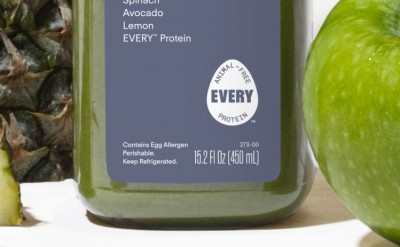Shiru raises $17m to launch bio-fermentation platform producing label-friendly alternatives to everything from methylcellulose to gelatin

Shiru’s proteins are designed to be used in a wide variety of products that currently utilise animal-derived proteins such as egg or dairy proteins, but can also be used to replace plant-based ingredients that don’t have consumer-friendly names such as methylcellulose, founder and CEO Dr Jasmin Hume told FoodNavigator-USA.
“We mine databases of plants to identify proteins that have certain functional qualities such as emulsification, gelation, solubility, and foaming that you get in things like dairy proteins, egg proteins, and gelatin.”
But rather than extracting those proteins from plants, which may not be efficient, or sustainable if they’re only present in small quantities, Shiru expresses them via genetically engineered microorganisms such as yeast or fungi.
“So we're developing the first database that connects protein identity with protein food related function, at scale,” said Hume, a biochemist formerly working as director of food chemistry at Eat Just, who is gearing up to move to a new 17,000sq ft facility in Alameda, California, early next year featuring laboratories, offices, and a pilot plant.
“And when I say at scale, I'm talking about millions of proteins, not a handful.”
‘We're developing the first database that connects protein identity with protein food related function, at scale…’
So what databases is Shiru mining?
“There are probably about a dozen databases that we aggregate information from, so publicly accessible databases that have been collected over decades, for all kinds of different applications, but never aggregated and leveraged in food before,” explained Hume.
“So companies that are doing identification of novel therapeutic compounds that are protein-based use these types of databases and the same approaches of leveraging structural biology, bioinformatics and machine learning. We're applying those same tools, but to solve the challenge of making the best protein food ingredients.”
‘We are a b2b company selling ingredients… but we are also going to be licensing ingredient solutions or technology to the food industry’
Asked about Shiru’s business model, she explained: “We are a b2b company selling ingredients to CPG companies large and small, globally. But we are also going to be licensing ingredient solutions or technology to the food industry, that may be to food CPG companies, but it's probably also to ingredients companies.
“We expect to announce our first partnership on the licensing side of things before the end of this year, and then in terms of us being able to deliver samples to customers, we're targeting end of Q1, 2022, for our food CPG customers.”
‘All of our proteins are plant proteins’
So if you’re selling a protein that’s found naturally in a plant, but you’re producing a nature identical version via a genetically engineered yeast or fungi, for example, is it accurate to call it ‘plant-based’ – a term Shiru deploys in its marketing materials?
In the sweeteners market, for example, firms producing steviol glycosides such as Reb M from bioengineered yeast, can label them as ‘Reb M’ or ‘steviol glycoside’ on pack, but not ‘stevia extract.’
According to Hume: “On the label, our ingredients will be labeled as ‘plant x protein,’ so whatever the botanical is, whether it’s soy, or pea, or rice, followed by the word protein. They’re nature identical proteins to the ones we find in plants. All of our proteins are plant proteins.”
Shiru is not doing what Perfect Day and The EVERY Company (formerly Clara Foods) are doing, which is making animal proteins such as casein or egg albumin from microbes instead of cows or chickens, but is instead finding proteins that are naturally produced by plants that have the same properties as things like casein, and then expressing them in microbes, she clarified.
Bio-fermentation more efficient and sustainable than extracting minor components from plants
But why not just extract the protein from the plant in question? “There are roughly 40,000 known plant species that humans have consumed over in history of our existence. Each plant expresses around 40,000 different protein molecules,” said Hume.
“And so when you think about soy and the isolates and concentrates that exist on the market that of course are extracted from soybeans, they only contain a dozen proteins or so in different concentrations.”
It may be, however, that – as with steviol glycosides, where the best-tasting ones are present in the leaves in the smallest quantities - the most functional proteins in plants that Shiru is most interested in, might be present in such tiny amounts that it doesn’t make economic sense to extract them from the crop, she said.
“Instead we leverage precision fermentation to be able to produce it in the most efficient high yield cost effective way.”
Proteins to replace casein in plant-based cheese?
Asked if Shiru could provide a couple of examples of things it’s working on, she said: “As one example, people seem to think that the only protein that can deliver the stretch you get in [dairy] cheese is casein.
“But we know from our vast database and our resources on the protein chemistry side, that that’s not true. We are identifying proteins that can replace things that people think there's only one solution for today.”
‘As functional as gelatin is, whether it's produced by extracting it from an animal source, or by microbial fermentation, the fact is that the consumer doesn't want to see it on the label’
The initial target is proteins that gel, she revealed: “So, that means they are liquid at room temperature, you heat them up, and they form a gel matrix. The reason that we've targeted gelation is because there are a lot of ingredients used just that function in the food industry, such as egg protein, fractions of dairy protein, collagen gelatin, but also some non protein ingredients such as methyl cellulose.
“Our initial ingredients can be used to replace any of those in a variety of different applications. And we're currently in talks with both early customers who are going to sign on to have early access to some of these ingredients as per our business model of scaling and delivering great ingredients to the market, but also some customers who are interested in licensing some of the ingredients.”
She added: “One thing that I'll mention in terms of feedback that we've gotten from customers is that, as functional as gelatin is, whether it's produced by extracting it from an animal source, or by microbial fermentation, the fact is that the consumer doesn't want to see it on the label.”
The GMO factor
So what about the GMO factor? If there is any detectible residual material from the engineered host microorganisms in Shiru’s ingredients, will they trigger bioengineered food labels [which come into effect January 2022)?
According to Hume: “It is something that is on our discussions with customers to be sure. I can't really comment on where we fall on that today, because when it comes to the determination of how much genetic material is in the final product, we are at such an early scale that we don't have those numbers yet.”
*The round was joined by returning investors Lux Capital, CPT Capital, Y Combinator, and Emles Venture Partners. New investors The W Fund, SALT, and Veronorte also participated, bringing Shiru’s total funding to date to more than $20m.

















